| | | | | | | Presented By Mizzen+Main | | | | Axios World | | By Dave Lawler ·Dec 06, 2021 | | Welcome back to Axios World. - Tonight's edition (1,846 words, 7 minutes) begins on the Russia-Ukraine border and ends in Equatorial Guinea.
New arrival? Subscribe. | | | | | | 1 big thing: Biden's push to keep Putin out of Ukraine | 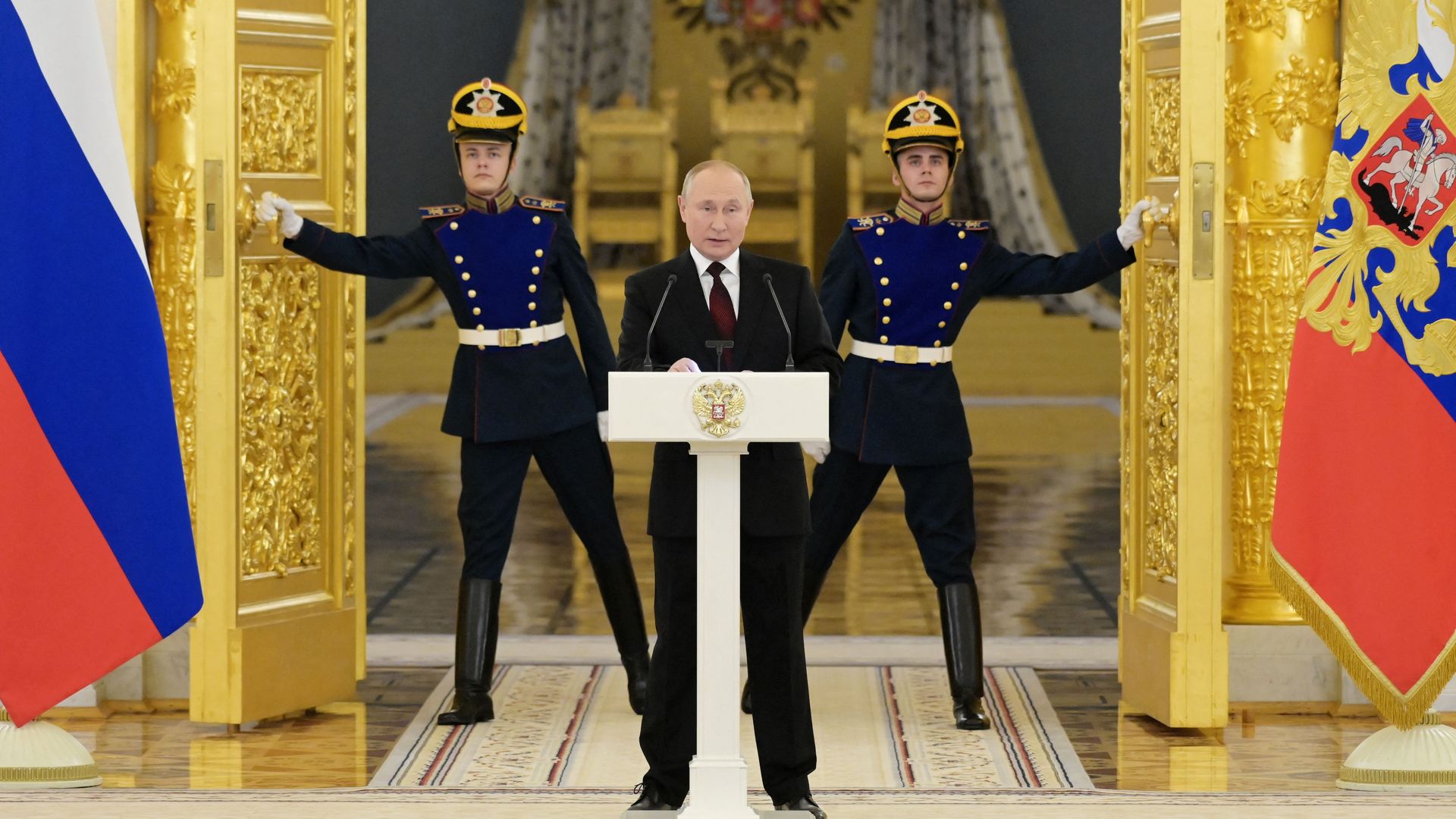 | | | Putin in the Kremlin. Photo: Grigory Sysoyev/Sputnik via Getty | | | | President Biden will seek to convince Russia's Vladimir Putin in a phone call tomorrow that the price of invading Ukraine would be steeper than anything he's faced in the past. Driving the news: Biden held a call on Ukraine this evening with the leaders of France, Germany, Italy and the U.K., while Secretary of State Tony Blinken called Ukrainian President Volodymyr Zelensky to offer America's "unwavering support." State of play: The U.S. has been coordinating sanctions with European allies to be triggered if Putin proceeds. - A senior administration official told reporters today that the U.S. is also prepared to send additional military aid to Ukraine and increase its troop presence, capabilities and military exercises on NATO's "eastern flank" in response to a Russian incursion.
Yes, but: The U.S. has no intention of using military force to defend Ukraine, and Putin is "not afraid of sanctions at all," says Tatiana Stanovaya, founder of Moscow-based political analysis firm R.Politik. - The most drastic sanctions move reportedly under discussion would involve disconnecting Russia from the SWIFT international payments system. Russia's central bank has already worked with Russian banks to prepare for that scenario, Stanovaya notes.
Russia has deployed some 94,000 troops to various points near the border, and is "stepping up its planning for significant military action against Ukraine," the senior official briefed reporters ahead of the Biden-Putin conversation. - The White House has also warned that the Kremlin is waging a disinformation campaign against Ukraine, potentially as a pretext to blame Kyiv for any military clash.
- "We do not know whether President Putin has made a decision about further military escalation in Ukraine. But we do know that he is putting in place the capacity to engage in such escalation should he decide to do so," the official said.
- Flashback: This is the second time a looming crisis has triggered a high-profile tête-à-tête with Putin — the first being the Geneva summit in June. The administration had hoped to keep Russia on the back burner, avoid escalation, and focus on China.
The other side: Putin has set out red lines of his own ahead of the call, including the potential deployment by NATO of offensive missiles systems on Ukrainian territory. - He's also seeking a legally binding guarantee that NATO will not expand eastward, including to Ukraine.
- In addition, Moscow has objected to NATO exercises near the Russian borders and increased cooperation between the alliance and Ukraine.
- Zelensky today visited the front lines of Ukraine's simmering conflict with Russian-backed separatists and issued a statement saying Ukraine's military was prepared to "thwart any conquest plans of the enemy."
- Reality check: NATO appears unlikely to either invite Ukraine to join anytime soon or to guarantee it never will.
What to watch: "I think what Russia is engaged in is diplomacy by other means. ... 'They will not listen to my entreaties, they will not listen to my diplomatic notes, they will pay attention only to my troops movements,'" says Dmitri Trenin of Carnegie Moscow. - Trenin considers an invasion unlikely, not because of the sanctions threat but the high military cost.
- However, Stanovaya expects Putin to issue Biden an "ultimatum." If the U.S. and its allies won't seriously engage over his desired security guarantees by early next year, "he will go to war," she says.
- "I have never seen him in a position where he felt himself so strong, arrogant, self-confident and ready to go much further than we can imagine," she adds.
|     | | | | | | 2. Global news roundup |  | | | Voting by marble, in Gambia. photo: Sally Hayden/SOPA Images/LightRocket via Getty | | | | 1. A Myanmar court sentenced ousted leader Aung San Suu Kyi to four years in prison on charges of "inciting public unrest" and breaking COVID-19 protocols. The military junta then halved the sentence to two years. She still faces additional charges. - Driving the news: Ten months after the coup, the military continues to crack down hard on ongoing displays of civil disobedience. A military vehicle rammed a group of protesters on Sunday, killing at least one person.
2. The U.S. today announced a diplomatic boycott of the 2022 Beijing Winter Olympics. 3. Indian troops killed six coal miners in a botched raid on Saturday after mistaking them for a militant group, and then they killed seven villagers during the ensuing unrest. - What to watch: The incidents have led to calls to repeal an act that gives soldiers in certain border regions additional powers to carry out arrests and attacks, and provides immunity from prosecution.
4. Police in Gambia used tear gas to disperse protests today after opposition candidates rejected election results that showed incumbent President Adama Barrow as the runaway winner. - These were the first elections in nearly 30 years in the small West African country not to include Yahya Jammeh, the autocrat who lost to Barrow in 2016.
- Worth noting: Gambians vote not with ballots, but by dropping marbles in metal drums.
5. Peruvian President Pedro Castillo faces an impeachment vote tomorrow, just four months after taking office. - The political newcomer has reversed himself on several key decisions, alienated his leftist allies with some Cabinet picks, and been hurt by corruption allegations against his chief of staff.
- The backstory: Peru impeaches presidents more than almost any other country (it requires just 40% of the legislature to impeach and two-thirds to convict) and is beginning to look almost ungovernable.
6. Some kids in Manila returned to school today for the first time in nearly two years as the Philippines phases out one of the world's longest school closure policies. 7. India's fertility rate has fallen below replacement level, according to the Economist, as more women go to school and access to contraception increases. The percentage of girls getting married by 18 has fallen by half over the past 15 years. - India's population is now expected to peak at around 1.6 billion in 30 years.
|     | | | | | | 3. Data du jour: Farewell, Angela |  Data: Axios Research; Chart: Kavya Beheraj/Axios Olaf Scholz will take office on Wednesday as Germany's first new chancellor since 2005. |     | | | | | | A message from Mizzen+Main | | The lightweight shirt that lets you skip the dry cleaner | | |  | | | | Mizzen+Main combines the comfortable flexibility of athletic wear with the style and fit of a custom dress shirt. Key numbers: With more than 30,000 five-star reviews, Mizzen+Main is helping people get excited about wearing dress shirts again. Get $35 off on your order of $125 or more. | | | | | | Bonus: Where in the world | 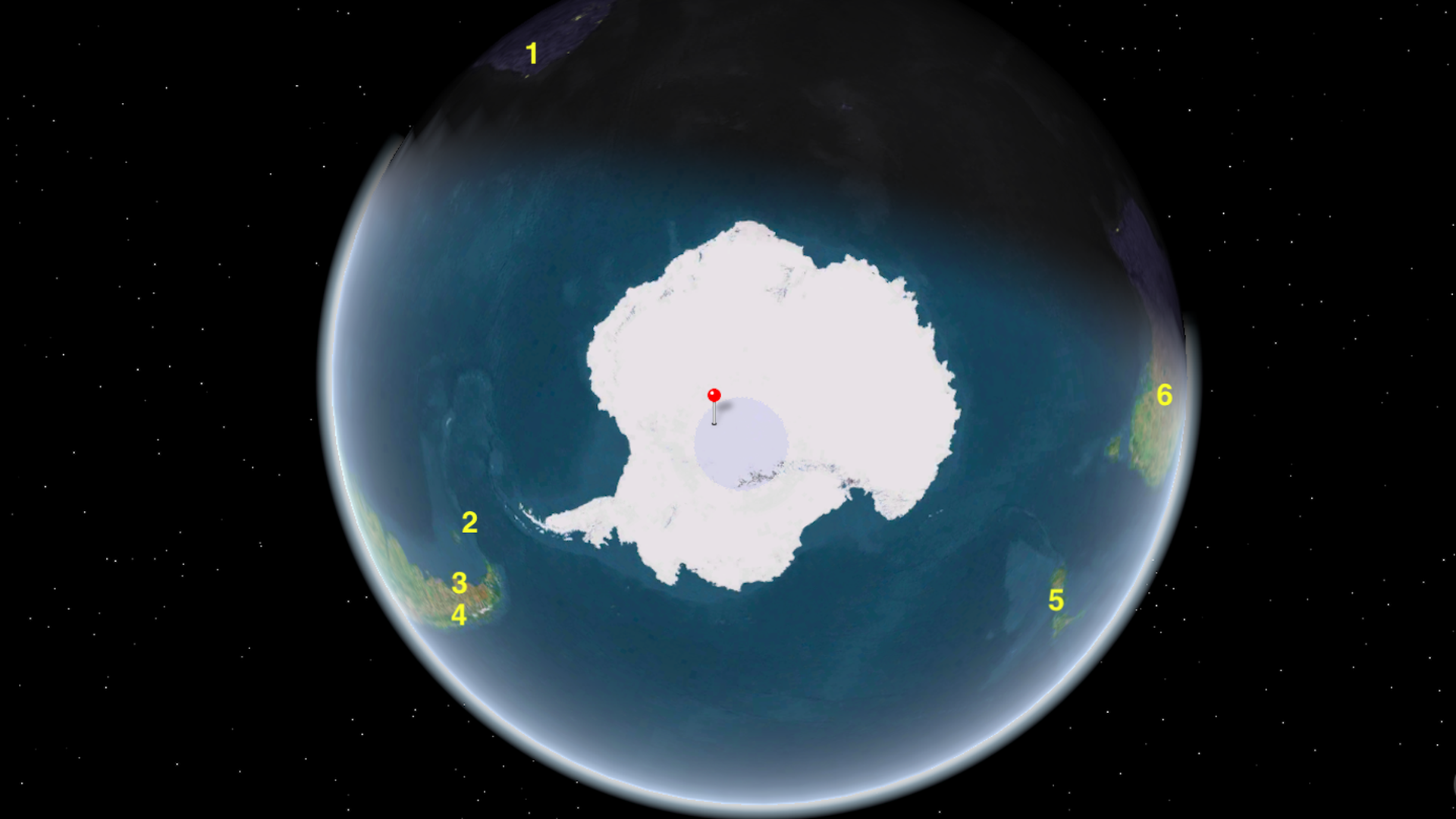 | | | Screengrab via Apple Maps | | | | Today we're starting in the South Pole (red pin) and visiting a disputed territory (No. 2) and five of the world's southernmost countries. Can you name them? Scroll to the bottom for the answers. |     | | | | | | 4. Ethiopia: U.S. and allies denounce arbitrary arrests of Tigrayans | 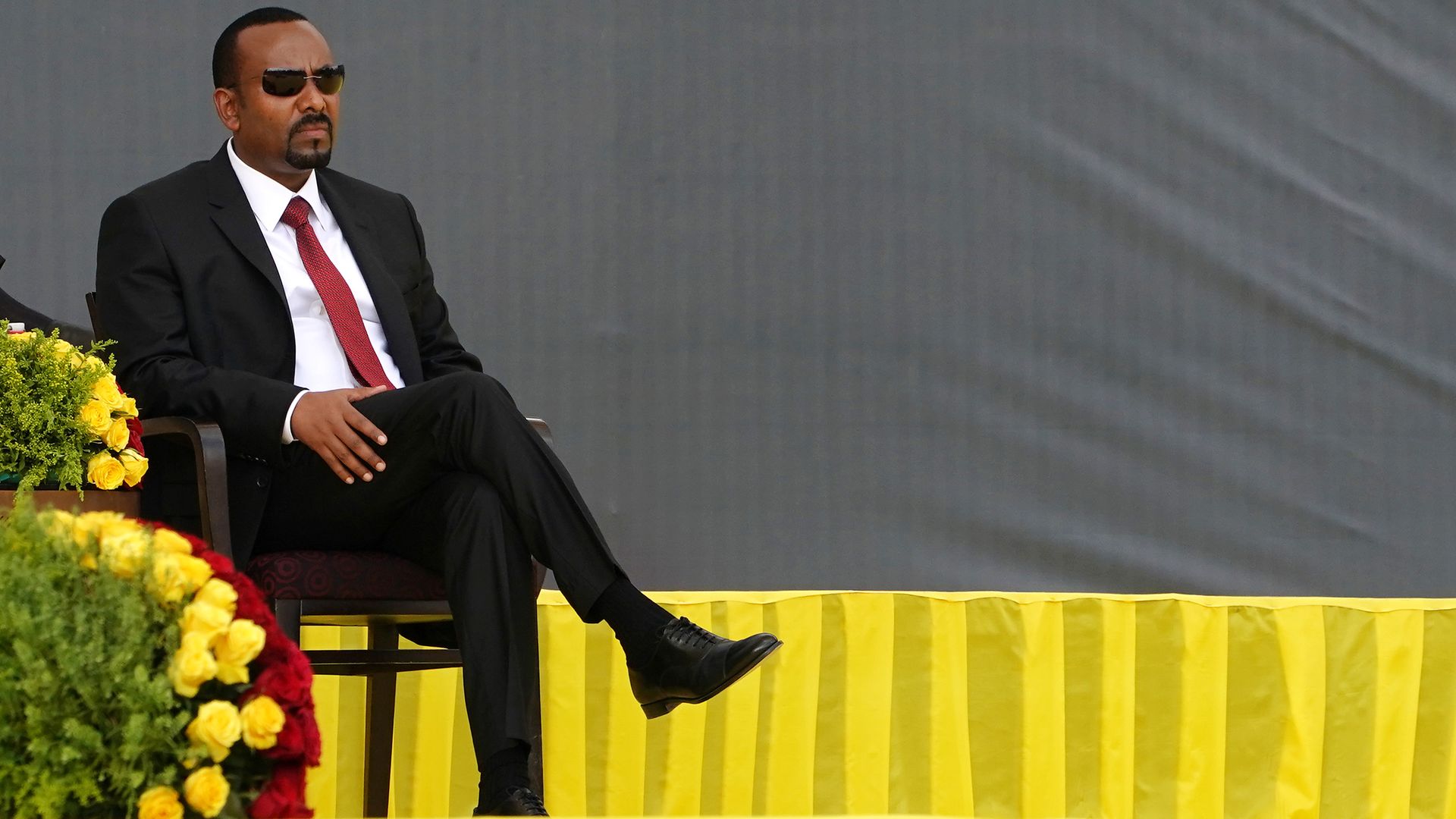 | | | Prime Minister Abiy Ahmed. Photo: Jemal Countess/Getty Images | | | | The U.S. and several allies released a joint statement on Monday condemning "widespread arrests" in Ethiopia made on the basis of ethnicity, specifically of ethnic Tigrayans. What they're saying: "Individuals are being arrested and detained without charges or a court hearing and are reportedly being held in inhumane conditions," Australia, Canada, Denmark, the Netherlands, the U.K. and the U.S. said in a joint statement, noting that those arrested include "Orthodox priests, older people, and mothers with children." Driving the news: Since a state of emergency was declared on Nov. 2, hundreds of Tigrayans have been arrested in their homes, at their workplaces and on the street and taken to overcrowded detention centers, the New York Times reports. - The Ethiopian government claims the detained people are supporters of the Tigray People's Liberation Front (TPLF), which has been declared a terrorist group.
- Witnesses told the Times they're often arrested on the basis of their names, accents and other distinguishing features. The message that all Tigrayans are "traitors" to be punished has spread widely on platforms like Facebook.
State of play: The TPLF was the most powerful political faction in Ethiopia prior to Abiy's rise, and TPLF leaders challenged the prime minister's legitimacy in a standoff that led last November to civil war. - The TPLF was quickly pushed out of the Tigrayan capital but mounted a counter-offensive and had been advancing toward the capital, Addis Ababa.
- Abiy announced on Nov. 23 that he would lead the federal forces from the front lines. The government announced the recapture of two key towns today.
What's next: The UN and U.S. are calling for a ceasefire, but prospects currently appear dim. They're also pressing Abiy to stop blocking food supplies from reaching Tigray to prevent mass starvation. |     | | | | | | 5. Timeline: Two years of COVID-19 |  Data: Our World in Data; Chart: Axios Visuals Two years ago Wednesday, the first case of a mysterious new respiratory disease was discovered in Wuhan, China. The big picture: More than 5 million people have died since that first case. Most people on Earth have lived through some form of lockdown. 54% of the global population has had at least one vaccination, though the shots have been distributed unevenly. - We know much more about the disease and how to treat it, but now the Omicron variant has deepened concerns about just how much longer the coronavirus pandemic will last.
Here's a look at the world's pandemic journey over the past two years: - Dec. 8, 2019: The first known patient in Wuhan, China, experiences symptoms of a disease that would later be identified as COVID-19.
- Feb. 23, 2020: Italy becomes the first country outside of China to impose a lockdown.
- March 11, 2020: The WHO declares a pandemic, with 4,616 deaths recorded.
- April 2020: School closures affect 82% of the world's students, according to UNESCO.
- Sept. 28, 2020: The world crosses 1 million deaths.
- December 2020: The FDA authorizes Pfizer (Dec. 11) and Moderna (Dec. 18) for emergency use.
- March 24, 2021: Fast becoming the pandemic epicenter, India suspends vaccine exports.
- Early July 2021: After falling sharply in the spring, cases begin to rise again in both the U.S. and EU, with the unvaccinated hit hardest.
- July 29, 2021: Israel announces that it will begin administering booster shots, starting a trend across most wealthy countries.
- Nov. 1, 2021: The official worldwide death count hits 5 million.
- Nov. 5, 2021: Half of the global population has had at least one shot.
- Nov. 25, 2021: South Africa reports the Omicron variant.
|     | | | | | | 6. What I'm reading: China's next move in Africa | 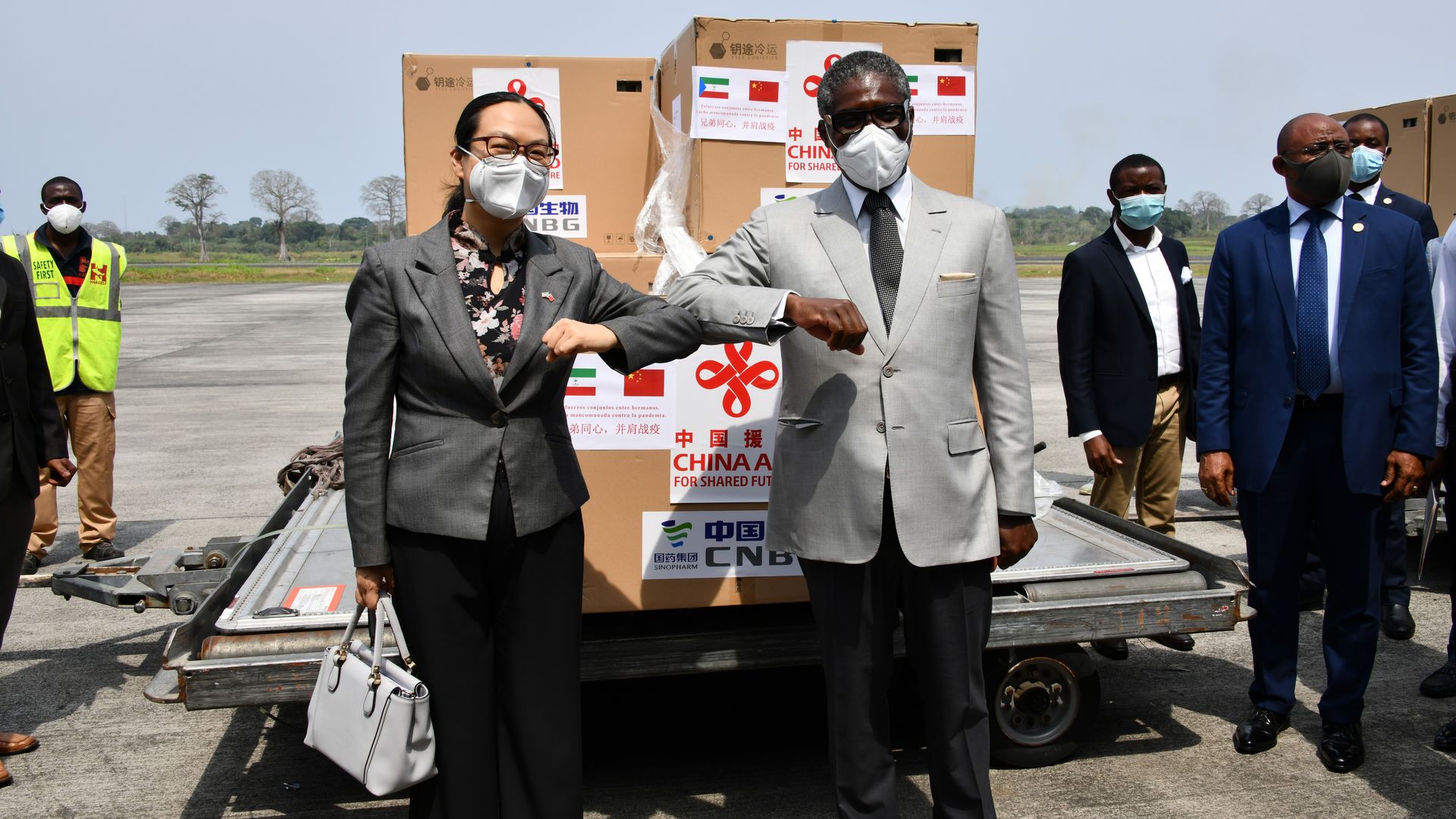 | | | Vice President "Teodorin" Nguema Obiang Mangue greets a vaccine shipment from China, alongside the Chinese ambassador. Photo: Li Boyuan/Xinhua via Getty | | | | China plans to build its first permanent military presence on the Atlantic in tiny Equatorial Guinea, the WSJ's Michael Phillips reports. Zoom in: The oil-rich country of 1.4 million on the west coast of central Africa has been ruled for four decades by Teodoro Obiang Nguema Mbasogo. - His son and vice president, known as "Teodorin," has been investigated in the U.S., France and Switzerland for allegedly embezzling national resources to accumulate hundreds of millions of dollars' worth of property and luxury cars.
- Biden's deputy national security adviser, Jon Finer, quietly visited Equatorial Guinea in October to make the case that "it would be shortsighted of Equatorial Guinea to insert itself between the front lines of U.S.-China global competition," Phillips writes. The U.S. has also taken steps to build closer relations with the country.
My thought bubble: The need to court countries like Equatorial Guinea is an indication that Biden's China strategy will collide with his democracy agenda in uncomfortable ways. Flashback: China built its first overseas military base in 2017 in another tiny African state, Djibouti. |     | | | | | | 7. Stories we're watching | 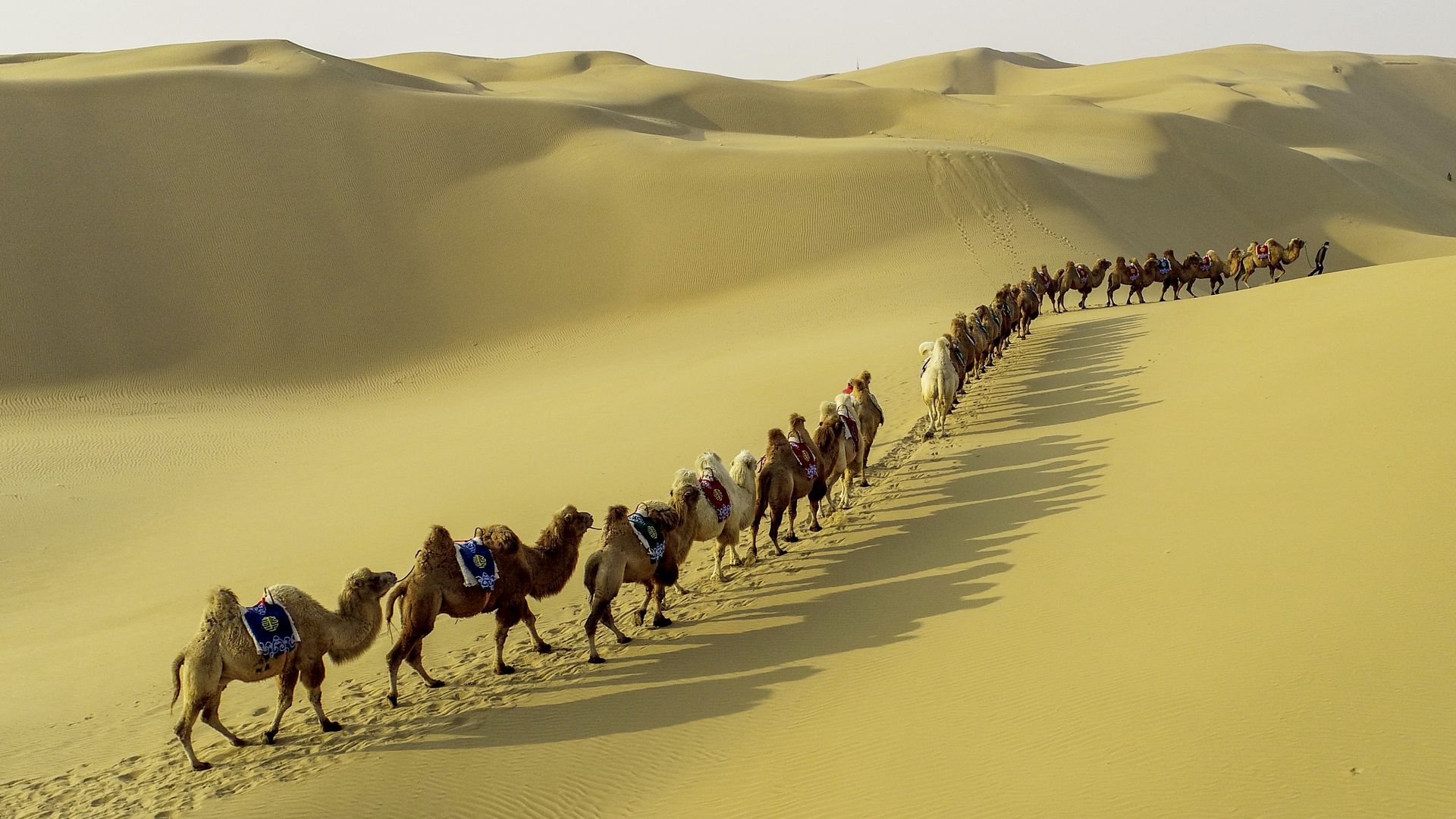 | | | Camels on the move in the Kubuqi Desert in Inner Mongolia, China. Photo: Wang Zheng/Costfoto/Barcroft Media via Getty | | | - New Biden initiatives: Fighting authoritarian surveillance; Countering corruption.
- World's most expensive city: Tel Aviv
- Iran talks not going well
- Indonesia eruption kills 13, injures dozens
- Huawei sanctions snarled chip supply chains
- Space Force leader warns of China's "incredible pace"
- Sportswashing in Saudi Arabia
Quoted: "The Western companies have lost their spectacles; they no longer have the eyes to see opportunities. But the Chinese see opportunities, and they come, and they are knocking, they are coming very vigorously." — Ugandan President Yoweri Museveni, to Reuters |     | | | | | | A message from Mizzen+Main | | Comfort is calling you | | |  | | | | Lightweight, breathable, and moisture-wicking, Mizzen+Main shirts are bringing all-day comfort to menswear, including: - Dress, polo, and flannel shirts.
- Dress pants, joggers, and shorts.
Get $35 off these performance fabrics with flexible, modern tailoring. | | | | Answers: South Africa (1), Falkland Islands (2), Argentina (3), Chile (4), New Zealand (5), Australia (6). |  | | It'll help you deliver employee communications more effectively. | | | | | | Axios thanks our partners for supporting our newsletters. If you're interested in advertising, learn more here.
Sponsorship has no influence on editorial content. Axios, 3100 Clarendon Blvd, Suite 1300, Arlington VA 22201 | | | You received this email because you signed up for newsletters from Axios.
Change your preferences or unsubscribe here. | | | Was this email forwarded to you?
Sign up now to get Axios in your inbox. | | | | Follow Axios on social media:    | | | | | |












No comments:
Post a Comment